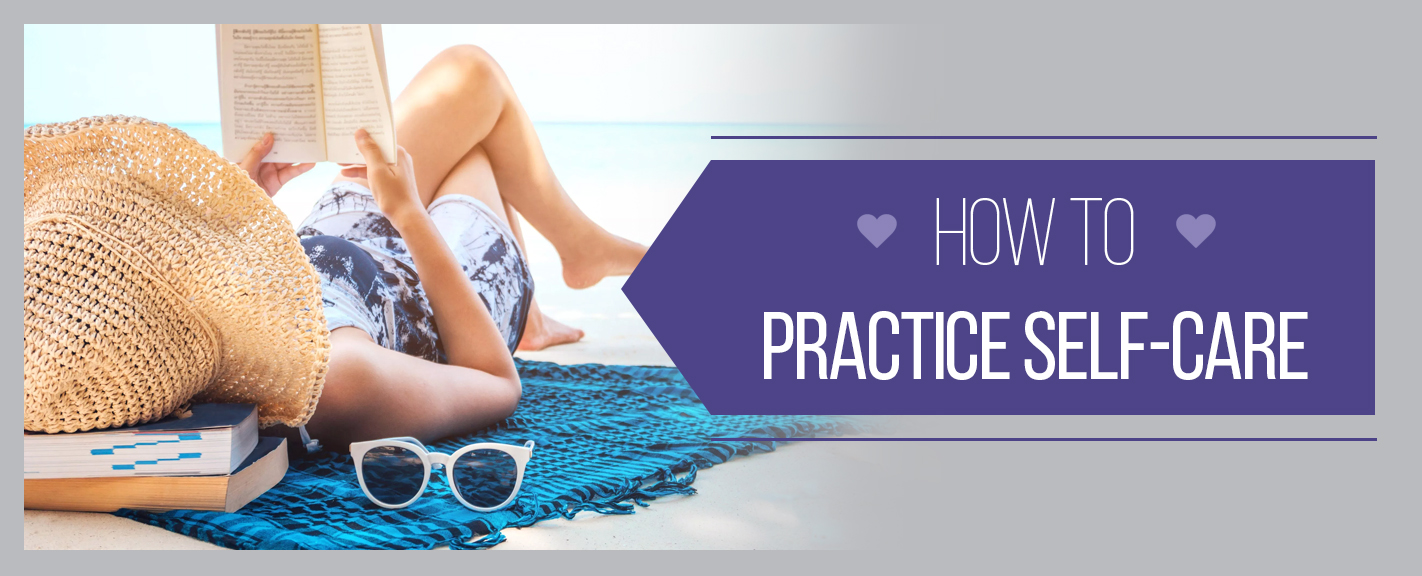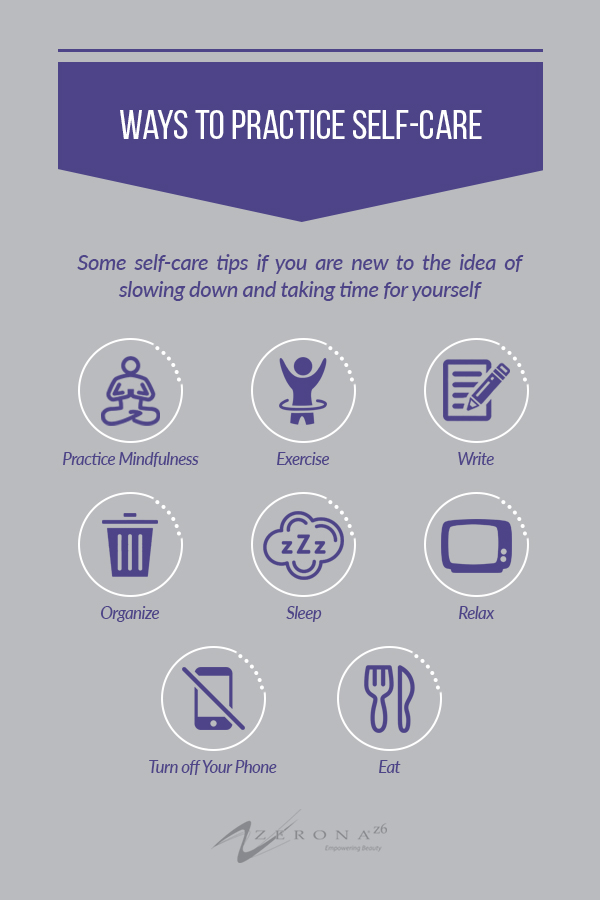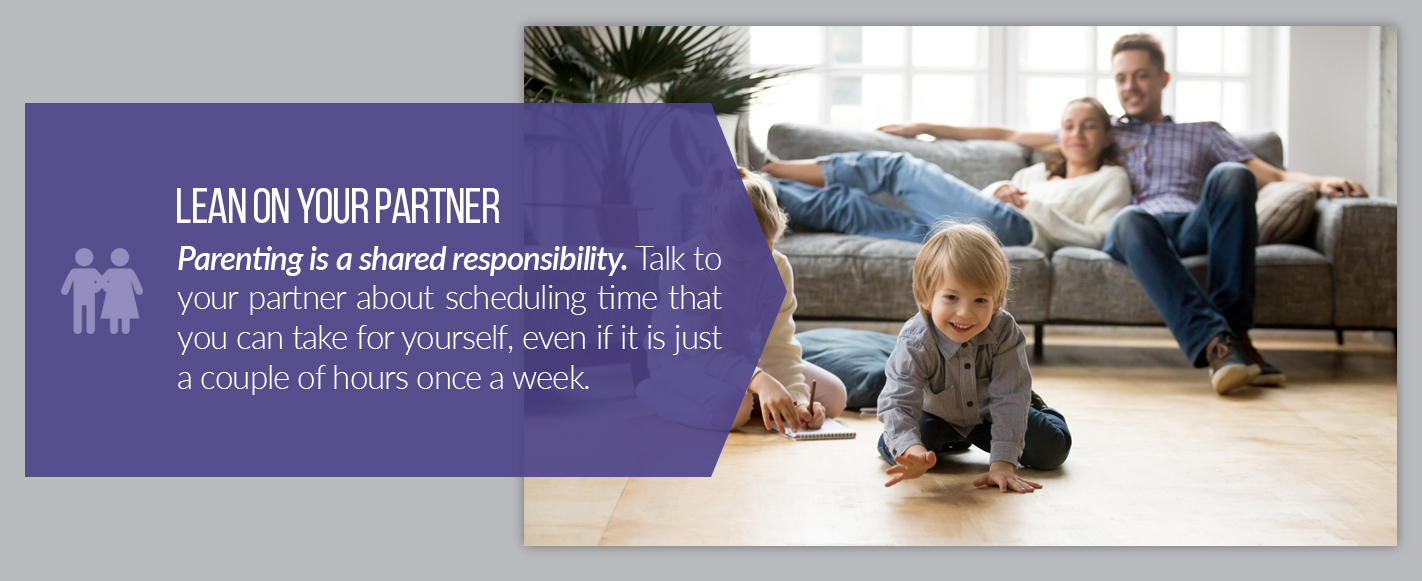
Today, it seems like everyone is juggling crazy to-do lists. Between work, family and social lives — all kept on track with phones never more than a hands-length away — we are all constantly “on.” In that continuous rush to check the next thing off of the list, we start to run ourselves down. We feel tired, but tell ourselves that so is everyone. We are hungry, but we skip lunch because we have to make that important deadline. When do we take time for ourselves?
“Self-care” is a broad term that means different things to different people. What it boils down to is setting aside time yourself. Take up a neglected hobby again, sleep in, go out to eat – self-care is anything you want it to be. It might sound self-indulgent or silly, but we all need self-care. It makes us happier, healthier and prepares us to tackle that to-do list with fresh energy. If you are wondering how to practice self-care, you can use this helpful guide as a starting point and find what works best for you.

Ways to Practice Self-Care
Self-care is not a rigid activity with prescribed steps. You know yourself best. Here are some self-care tips if you are new to the idea of slowing down and taking time for yourself, but feel free to play around with what self-care means to you.
1. Practice Mindfulness
Self-care for stay-at-home moms can be particularly challenging. You don’t get a lunch break to slow down and take a breather. You are with your kids all day long – making meals, wrangling cranky babies for nap time, cleaning up, playing, managing bath time and reading bedtime stories. You might not be able to take a long walk every day, but you can use your spare moments of downtime to practice mindfulness. Take five minutes to meditate. Meditation can be as simple as recognizing and observing the thoughts racing through your brain.
You can even practice mindfulness while you are actively parenting. For example, practice deep breathing while your toddler has an outburst. Perform a quick body scan to check in with your body as you give your baby a bath. Mindfulness helps us to connect with our minds and bodies.
2. Exercise
Exercise as self-care often makes people think of yoga. Yoga is certainly a viable option and great for quick at-home workouts, but any type of exercise can be self-care. Take a walk or go for a hike. Take up biking. Join a gym, or sign up for a group exercise class. The type of exercise is not as critical as the simple fact that you are getting up and being active. It can take hard work to make exercise a habit, but once it is, you will likely find it improves your mood as well as your overall physical health. Thirty minutes of exercise five times a week can be incredibly beneficial, but find the time and intervals that work for you. Any amount of exercise is better than none at all.
3. Write
Writing down your thoughts and feelings can be a fruitful self-care exercise. Pick up a pen and paper and reflect on your day. You might be surprised how slowing down to do this can help you think and approach your life from a different angle. This writing doesn’t have to take any particular form. It is not an email you’re composing for work or a story for someone else. It is for you alone. You can keep a traditional journal, chronicling each of your days in longform. You can opt for bullet journaling to keep things short and sweet. If you feel at a loss for what to write, list the people and things that make you grateful every day. Write down compliments to give the people you care about. Write down goals for yourself. The content isn’t always the most important part, but sitting down and taking time to put down your thoughts, whatever they may be, is what matters.
4. Organize
Clutter can add stress to your daily life. That pile of papers you have been meaning to get to forever or the messy kitchen cabinets that keep you searching for the right utensils every time you make a meal are a hassle. Organizing may not be your idea of a self-care, but it can have a positive effect. Break up all of those messes into small, bite-size chunks. When you have a spare moment, spend just a couple of minutes tidying your desk or your closet. Decluttering is a relatively simple task that can help you get a small and quick win. Plus, it is easier to be productive and to think clearly in an organized space.
5. Sleep
Sleep is a precious commodity. We all need it to feel refreshed and ready to take on the day. Adults need to get seven to nine hours of sleep each night. You may not notice the effects of getting less sleep, but they are there. You can’t think as clearly and affects your physical health. Prioritizing an extra hour or two of sleep each night is an essential aspect of self-care. After those seven to nine hours, you can wake up with the energy you need to face your day.
6. Relax
Relaxation is probably the most universally recognized type of self-care. Relaxation is all about taking time for yourself to let both your mind and body rest. For some people, getting lost in a good book or TV show is the definition of relaxing. For other people, it is taking a long bubble bath or getting a massage. Ask yourself what helps ease the tension of day-to-day life, and work to set aside time for those activities.
7. Turn off Your Phone
Burnout is a very real and common problem, often exacerbated by just how accessible information always is. Our work, email, social media and the endless news cycle are available as soon as we look at our phones. This is undeniably convenient, but it is also exhausting. Self-care can be as simple as putting your phone on silent, leaving it in another room or turning it off altogether. In that time without your phone, you can do anything you want. Spend time with your family. Take a bath or a quick nap. Catch up on reading. Your phone and all of that information will still be there when you get back.
8. Eat
Eating as self-care can take many forms. At the most basic level, healthy eating is a critical part of self-care. A balanced diet with the right amount of nutrients will help you feel healthier and more energetic. That doesn’t mean you have to cut out all of the foods that you love and crave. Treating yourself to something sweet or salty can also be a type of self-care. Sitting down for a quiet moment by yourself with a cup of coffee or tea is self-care. Getting creative and playing around in the kitchen to make something new can be a type of self-care.
Self-Care for Moms
Moms are truly the masters of multitasking. Some mothers stay at home to raise their kids, while others work part- or full-time while raising their families. No matter what path you choose, you are responsible for your little ones, running a household and maintaining a relationship with your partner. The pressure for mothers to be everything for their families — and to always look relaxed and happy doing it — is enormous. The idea of spare time can seem almost laughable. Even if you can take some time for yourself, you might feel guilty. You could always be doing more.
Forget about all of that pressure. Self-care for moms is just as vital as self-care for anyone else. Here are a few self-care tips for moms to try:

1. Lean on Your Partner
Parenting is a shared responsibility. Whether you are a stay-at-home-mom or a working mom, not everything falls on your shoulders. Talk to your partner about scheduling time that you can take for yourself, even if it is just a couple of hours once a week. Use that time to catch up sleep, go out with your friends or take a relaxing bath.
If you are a single mom, talk to your support system. Can your family or friends watch the kids for a few hours once in a while so you can take the time for self-care?
2. Involve Your Family
Not all self-care has to be about alone time. Self-care can be about eating healthier or unplugging for a while. Find ways to practice self-care and involve your family in the process. For example, have your partner and your kids help you with cooking a new tasty but healthy meal. Find a time when you can all agree to turn off your devices and do something fun together.
3. Remember Life Outside of the Kids
Motherhood is a core part of any mom’s identity, but that doesn’t mean it is the only thing defining you. Self-care can mean carving out hobbies outside of taking care of your kids. Sharpen a skill that you can use at work. Take a class. Learn something new. Give yourself permission to enjoy time to yourself.
4. Don’t Sweat the Expectations Too Much
Self-care for new moms and moms who have been raising kids for years is essential, no matter what motherhood may look like on the outside. Society has a lot of thoughts on what moms should look like and how they should act. Take a deep breath and let a lot of that go. If you are raising happy, healthy and safe kids, not much else matters. Dress how you want to dress, not how you think a mom should dress. Treat yourself to a night out with your friends and enjoy it instead of worrying about what people will think.

The Importance of Self-Care in Your Life
Slowing down may feel counterproductive, but self-care is not about neglecting all of your other responsibilities. In fact, it can help you succeed in the rest of your life. Being healthier and happier makes you a better parent, partner and team member at work. Here is how self-care can have a positive impact on your physical, mental and emotional health.
1. Physical Health
Our physical health is core to waking up and feeling good each morning. Our physical health is not always completely in our control, but we can perform some basic self-care to make a noticeable improvement. Eating healthy meals, regularly exercising and committing to a regular sleep schedule are essential to living a healthy lifestyle. It might be hard to change ingrained habits, like eating junk food, watching another episode instead of going out for a walk and staying up late to scroll through the feed on your phone. Remember that changing these habits is an important form of self-care.
2. Mental Health
Mental health might be harder to see than physical health, but it is just as critical to our quality of life. Self-care practices like meditation, relaxing and writing about our day can all contribute to improvement in our mental health. Exercise, though a physical activity, has been shown to improve mental health. These small, daily self-care activities can be helpful, but you should know that it is okay to ask for help. Life can be demanding and draining, even if you are not a mother. If you feel like you are sinking, reach out for a lifeline. Therapy can be a vital self-care tool.
3. Emotional Health
Emotional health is often thought of as interchangeable with mental health, but it is a distinct aspect of your life. Emotional health refers to your ability to express your feelings. Moms are often conditioned to bottle up their feelings. They think motherhood should be a joyful experience, and they should be happy all of the time. That is actually an unhealthy belief. You will have good days and bad days. That is inevitable. Emotional self-care will help you handle those ups and downs. Self-care activities like keeping a journal of your feelings and taking the time to talk through disagreements at home can help you live an emotionally healthy life.
Living a Better, Healthier Life
Self-care is something with no ultimate end goal or timeline. You can incorporate it into your routine as a way to savor your life and find small pleasures in the day-to-day. Along the way, self-care can help you become healthier, happier and more confident. Whether you are a new mom or not, you want to feel confident in your body. When you are deciding on your new self-care routine, Zerona Z6 can help you meet feel strong and proud of your body. This noninvasive treatment can help you lose inches from your waistline. Learn more about this option and find a Zerona provider near you.
Last Updated on July 15, 2019 by zerona

